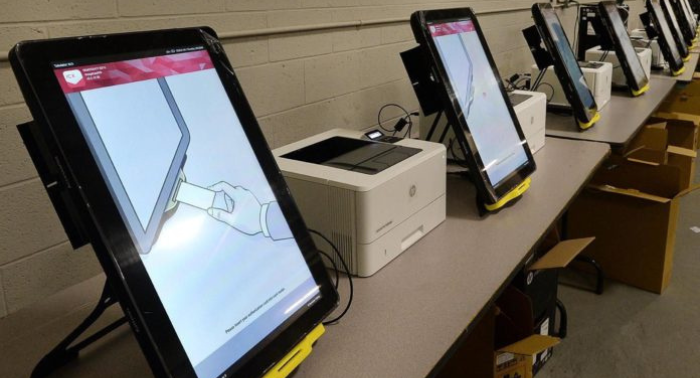Professor J. Alex Halderman of the University of Michigan, who demonstrated that Dominion Voting Systems machines were susceptible to hacking with a Bic pen and smart card. This revelation has sparked concerns about the security and integrity of the voting systems.
The trial, which began on January 9, involves a case filed in 2017 by the Coalition for Good Governance, a liberal activist group, against the state of Georgia. The suit contends that the state’s use of Dominion’s voting machines, which lack a verifiable print ballot, makes the voting counts vulnerable to manipulation.
Although Georgia election officials switched to Dominion Voting Systems in 2020, the Coalition for Good Governance continued to assert that the machines remained vulnerable to attacks. They also raised concerns about the paper QR codes provided to voters, which they argued were difficult to read and verify.
During the trial, Professor Halderman conducted a demonstration in which he used a Bic pen to insert into a Dominion voting machine, causing it to reboot into “safe mode.” He explained that this action could enable an individual to copy or alter files, change the machine’s settings, or install malware. Additionally, he pointed out that accessing the “terminal emulator” could grant a user “super-user” access, allowing them to manipulate the machine without limits.
Halderman also used a “$10” smart card to demonstrate how such cards could be programmed to replicate those used by poll workers, voters, and technicians to access the voting machines. He explained that poll worker and voter cards could be used to print numerous ballots.
A video played during the trial showed Halderman using a USB flash drive to alter votes outside the courtroom, highlighting the potential for undetectable tampering with election results.
U.S. District Court Judge Amy Totenberg, who is expected to issue a ruling in late spring or early summer, presided over the trial. The plaintiffs in the case emphasized that they were not disputing any specific election results in Georgia, and their lawsuit was unrelated to the 2020 election or defamation lawsuits brought by Dominion against various parties.
In response to the allegations and concerns raised during the trial, Dominion Voting Systems defended the security of its machines. They argued that Halderman’s experiment occurred in a controlled environment and that he had been given access to all necessary equipment, including passwords and security cards, to attempt to hack the machines. Dominion stated that Halderman was unable to prove that an election could be successfully hacked, and they deemed his scenario implausible.
Dominion also cited the U.S. Cybersecurity and Infrastructure Security Agency’s conclusion that Halderman’s assertions were mitigated by existing election procedures and protocols, which have been strengthened over the years.
Despite these assurances, critics of the new voting system argue that the devices are not voter-verifiable, secure, or reliable. They contend that the vulnerabilities and issues with the old system persist.
The trial in Georgia has reignited discussions about the security of voting systems and the ongoing debate over election integrity in the United States. While concerns about voting machine security are not new, this case highlights the continued importance of addressing these issues to maintain public trust in the electoral process.




